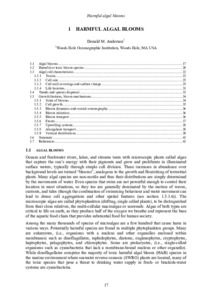Harmful algal blooms.

View/
Average rating
votes
Date
2017Author
Anderson, Donald M.
Status
Published
Metadata
Show full item recordAbstract
Harmful algal blooms are increasing in frequency and magnitude in many parts of the world,
and one of the sectors of society that is being increasingly affected is the desalination
industry. Given trends in the development of that industry, as well as the global expansion of
the HAB problem, impacts will continue to occur, and are likely to increase. Desalination
plant operators and managers are urged to take a more active role in determining the nature of
the algal populations that are in the waters near their intakes, as this can directly help with
identification of timely and appropriate mitigation strategies. One of the many challenges
desalination plant managers face is that HABs are incredibly diverse in terms of toxicity, cell
size, morphology, and bloom dynamics, and this diversity needs to be recognized when
developing and implementing monitoring and mitigation strategies. Partnerships between
regional HAB scientists and desalination operators and managers are encour.....
Title of Report
Harmful Algal Blooms (HABs) and Desalination: a Guide to Impacts, Monitoring and Management.Editor(s) of Report
Anderson, D.M.Boerlage, S.F.E.
Dixon, M.B.
Page Range
pp.17-52Publisher
Intergovernmental Oceanographic Commission of UNESCOParis, France
Series;Nr
Intergovernmental Oceanographic Commission Manuals and Guides;78Document Language
enSustainable Development Goals (SDG)
14.1Essential Ocean Variables (EOV)
Phytoplankton biomass and diversityBest Practice Type
ManualCitation
Anderson, D.M. (2017) Harmful algal blooms. In: Harmful Algal Blooms (HABs) and Desalination: A Guide to Impacts, Monitoring and Management. (eds. Anderson D. M.; Boerlage, S. F. E. and Dixon, M.B.). Paris, France, Intergovernmental Oceanographic Commission of UNESCO, pp.17-52. (IOC Manuals and Guides No. 78). DOI: http://dx.doi.org/10.25607/OBP-204Collections
 Repository of community practices in Ocean Research, Applications and Data/Information Management
Repository of community practices in Ocean Research, Applications and Data/Information Management